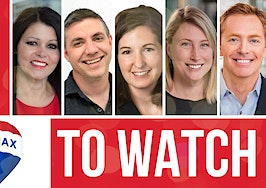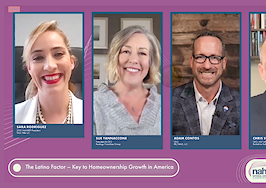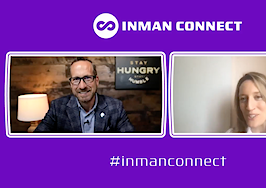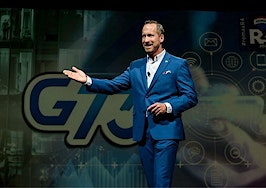In a world filled with political upheavals, public health crises, and a plethora of challenges that inherently come with everyday life, it’s easy to be fearful, angry, despondent and anxious about what may come next.

Adam Contos
RE/MAX CEO Adam Contos said he’s faced plenty of those fearful moments, but has learned how to transform them into wins for not only himself, but the thousands of agents, brokers, and staff who count on his guidance.
“The only way to meet fear is with love,” he told Inman of his winning strategy. “Fear meeting fear does nothing but create friction.”
“People have a fear emotion for a reason — they might not understand [an issue they’re facing] or don’t have an answer for that challenge that they’re facing internally,” he added. “So we need to appreciate that and help them overcome that challenge, collectively, both of us together. That’s how you get to the love perspective, which is unconditional giving.”
In his new book, “Start With a Win,” Contos shares how to master fear and lose the ego so you can have more wins inside and outside of the office. “Don’t be a know-it-all, be a give-it-all,” he said. “Look for the wins and create little bitty wins, micro-wins, and create macro-wins. That’s what this industry is about. Going out and helping other people win as well.”
Here’s what Contos had to say about the writing process and what he hopes readers gain from the book, which became available for pre-order on Tuesday. All proceeds will go to the Children’s Miracle Network Hospital.
Inman: Your book is inspired by your podcast, Start With a Win. What led you to start the podcast and begin the process of distilling it down into a book?
‘Start With a Win’ started because I wanted to help people. You stand there, you have a conversation with somebody, they ask for your advice and you use you share with them ideas to help them overcome their challenges. We exist in life to help people overcome their challenges — you meet somebody, you win their trust and confidence, you learn about their challenges, and you help them overcome those, which really, it’s kind of what real estate is about.
I wanted to put those [insights] into some sort of medium that people could consume. I was at the Social Media Examiner’s Social Media Marketing World event, and Michael Stelzner, who was the founder of that organization, said, “Do you have a podcast?” I said, “No,” and he goes, “You should have one.”
It took me a couple of years to get the courage up to start the podcast. Then I got a call from a publisher at Wiley, the company that’s publishing my book. They said, “Have you thought about writing a book with some of these ideas?” And I said, “Yeah, I’d love to; it’s kind of on my bucket list.”
And here we are.
As a journalist, I always get asked when I’ll write a book, but I know it takes a different set of skills to write a 60,000-word book versus a 2,000-word article. So, what was the writing process like for you? What did you learn?
It was an interesting process. I’ve never obviously written a book before; this is my first one. [The publisher] gave me a target of 55,000 to 60,000 words, and I built an outline, which changed a couple of times. I read a whole bunch of blogs, articles, journals on how to write a book, and then I started just spilling my ideas on the page.
I came up with almost the entire manuscript, or the majority of it, if you will, and I sent it off to the publisher. They said, “Well, you have a lot of great things in here, but we can’t publish what you just sent us. So we recommend you get some help. Get somebody to sit down and help you organize your ideas.”
So I brought in an expert, who has advised other authors, and I said, “Can you help me with all of this?” We’d sit down and, chapter by chapter, go through what I had created, talk about it and reconstruct that chapter with her advice. I was used to writing short-form items, like a letter, and I had written obviously, police reports for a decade before I came to RE/MAX, and none of those things sell as a book.
The idea was to put things in a format that people would appreciate and gain some entertainment and some education. It’s been multiple iterations over the past nine to 12 months to accomplish where we’re at today. Because of COVID, I’ve still, to this day, never met my editor in person, but we’ve become great friends.
That reminds me of journalism school — they said you always have to put a little bit of cheese on the broccoli so people will pay attention. So, I’m looking through the chapter highlights of your book, and most of them deal with emotional intelligence and mental health. Those two topics have really come to the forefront during the pandemic.
Yes. I heard it put best recently at a mastermind — the marketplace is no longer in competition for the consumer; the marketplace is in competition for the consumer’s emotions. I truly believe that. The book was written before I heard that, but the reality is, I think we’ve taken emotions for granted in society. The reality is that people want to do business with people that they like, and an emotional connection is necessary.
People judge your emotions based upon your behavior because emotions, create our behaviors and our behaviors create our actions. So when you take a look at everything that everybody’s been through, there’s been a lot of pressure on everybody in society. It might be a good tailwind in your business or it might be a massive headwind. It’s the same thing in your personal life, just depending on everything you’ve been through and maybe even in your health.
This is kind of a COVID book. In the book, I talk about two emotions — our default emotion, which is fear, and our intentional emotion, which is love. When you look at fear, you have fight, flight or freeze, and you have the fact that when fear is internalized, it’s depression. When it’s externalized, it’s anger. So how do you recognize and understand that in other people act accordingly?
Well, the only way to meet fear is with love. Fear meeting fear does nothing but create friction.
People have a fear emotion for a reason — they might not understand [an issue they’re facing] or don’t have an answer for that challenge that they’re facing internally. So we need to appreciate that and help them overcome that challenge, collectively, both of us together. That’s how you get to the love perspective, which is unconditional giving.
Just look at even the real estate transaction. What’s the challenge? They need to sell a house or they need to buy a house, and maybe they need to find funding to go with that. Maybe they’re concerned about something that has to do with the transaction, and going in and arguing with them over that [issue] accomplishes nothing. But gaining their trust and confidence by supporting and working through [the issue] together with the intention of creating a win for them, that’s giving unconditionally into that relationship. That’s love.
If you look at people and they have a problem in life, appreciate that they have a challenge or a problem. Go into it and say, “Thank you for your emotions, and thank you for your passion for this. I love that you’re sharing this with me. Can I help you? Let’s solve this together.”
I think life, for all of us, would be so much better if we all approached stuff that way.
I agree. In another chapter, you mentioned that in order to operate in love, you must lose the ego. Throughout my time at Inman, I’ve heard a lot about real estate becoming more of an ego-driven industry and how that, at times, causes friction with consumers. How can agents lose the ego? What goes in its place?
I started chapter eight, Losing the Ego, with “Don’t be a know-it-all, be a give-it-all.”
The reality of the ego is it’s the biggest success blocker on the planet because the ego is you’re afraid of everybody finding a weakness or you’re afraid that somebody is going to challenge you on something. It’s fear. [Ego] is this big fear shield that people put up in front of them, instead of just being vulnerable, for crying out loud, and understanding that we’re all flawed in some way, shape, or form.
A lot of times what people try to do when they’re wrong or they don’t know the answer to something, they try to protect their ego, as opposed to just being transparent and saying, “I don’t know” or “I might have a different perspective and let’s see we can come up with together.”
Confidence and ego come from the same place, but you don’t want to be known as being egocentric. You want to be known as being kind and confident, which still has some ego to it, but has a presence that people want to associate with.
Lastly, you talk about “the winning approach,” which in addition to leading with love and losing the ego, requires us to stay in the present. Again, that’s hard for many people to do, especially in the middle of a pandemic. How have you learned how to stay in the moment?
In the book, I talk about the beast. We all have a beast within us, which is the fear that we carry around every day. That beast can cause you to have extreme pressure, overwhelm, fear, anxiety [and] just massive emotional challenges. I said earlier your emotions create your behaviors, [and] your behaviors create your actions. What happens when we’re exploding with that fear and overwhelm?
We’re shutting down relationships; we’re creating conflict. We’re not seeking resolution and positive outcomes. We’re not thinking about the end game. We’re just going in for a fight, and that doesn’t work well for anybody, given the tension that we feel in this day and age.
Think about it this way — think back to when you’re a young child and the lights are off and maybe you have to get up and walk down the hall, and you’re afraid because it’s dark. We have to figure out how can we not fear the beast, but how can we enjoy being with the beast and turn it into a positive thing.
We can find the beast and use that fear to our advantage. Turn that negative tension into positive tension in order to grow, and seek new thoughts, ideas and opportunities. Ultimately, what we’re trying to do is not be afraid of the beast, we’re trying to party with the beast.
You don’t know what will happen next. When our children walk out the door to go to school, we hang up the phone with one of our loved ones, we meet or we’re going to meet a new client, we don’t know what’s going to happen. We fill these unknowns with stories of the worst-case scenario, but what we need to fill them with is stories of the best-case scenario because that’s where we learn to party with the beast.
We take advantage of that unknown and walk into it looking for opportunity. Ultimately it comes down to how do we, no matter what it is — COVID, a changing real estate market, the need for a new business process — instead of pushing against it, embrace it and party with the beast. Because when we embrace [our fears], it creates opportunity. That opportunity can create better things for us and for our clients.
What’s the main takeaway you want readers to get from your book?
Life has a series of challenges and opportunities for us. Life is about taking chances. You’re going to have some failures, but make those learning opportunities, as opposed to being down on yourself. When you learn, you’ve just received a gift from your challenge. That [gift] is an opportunity to do something better with the knowledge that you have.
Look for the wins and create little bitty wins, micro-wins, and create macro-wins. That’s what this industry is about. Going out and helping other people win as well.









